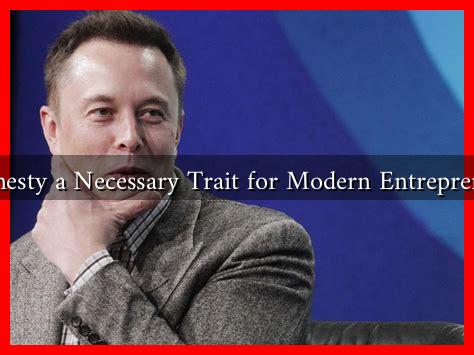-
Table of Contents
Is Honesty a Necessary Trait for Modern Entrepreneurs?
In the fast-paced world of entrepreneurship, where innovation and competition are at an all-time high, the question of whether honesty is a necessary trait for modern entrepreneurs is more relevant than ever. As businesses navigate complex markets and consumer expectations, the role of integrity in leadership becomes a focal point for success. This article explores the importance of honesty in entrepreneurship, supported by examples, case studies, and statistics.
The Foundation of Trust
Honesty is often regarded as the cornerstone of trust. For entrepreneurs, building trust with customers, employees, and investors is crucial for long-term success. When stakeholders believe in the integrity of a business, they are more likely to engage with it. Here are some key reasons why honesty fosters trust:
- Customer Loyalty: Honest communication about products and services leads to stronger customer relationships. A study by Harvard Business Review found that 81% of consumers are more likely to purchase from brands they trust.
- Employee Engagement: Transparent leadership encourages a culture of openness, which can enhance employee morale and productivity. According to a report by Gallup, organizations with high employee engagement are 21% more profitable.
- Investor Confidence: Investors are more likely to support businesses that demonstrate ethical practices. A survey by PwC revealed that 78% of investors consider a company’s ethical standards when making investment decisions.
Case Studies: Honesty in Action
Several successful entrepreneurs have demonstrated that honesty can lead to remarkable outcomes. Here are a few notable examples:
- Patagonia: The outdoor clothing brand is known for its commitment to environmental sustainability and ethical practices. Their “Don’t Buy This Jacket” campaign encouraged consumers to think twice before purchasing, showcasing their honesty about consumerism and environmental impact.
- Elon Musk: The CEO of Tesla and SpaceX is known for his candid communication style. Musk’s transparency about challenges and setbacks has garnered him a loyal following and investor confidence, even during turbulent times.
- Buffer: The social media management platform is renowned for its radical transparency. Buffer openly shares its revenue, salaries, and decision-making processes, which has built a strong community of trust among its users and employees.
The Risks of Dishonesty
While some entrepreneurs may be tempted to cut corners or misrepresent their products for short-term gains, the long-term consequences can be detrimental. Dishonesty can lead to:
- Reputation Damage: Once trust is broken, it can take years to rebuild. Companies like Enron and Theranos serve as cautionary tales of how dishonesty can lead to catastrophic failures.
- Legal Consequences: Misleading advertising or fraudulent practices can result in lawsuits and regulatory penalties, further damaging a company’s reputation and financial standing.
- Loss of Customer Base: Consumers are increasingly aware of corporate ethics. A survey by Accenture found that 62% of consumers want companies to take a stand on social, cultural, and political issues, indicating a preference for brands that align with their values.
Conclusion: The Imperative of Honesty
In conclusion, honesty is not just a moral choice for modern entrepreneurs; it is a strategic imperative. The benefits of fostering trust through honest practices far outweigh the risks associated with dishonesty. As the business landscape continues to evolve, entrepreneurs who prioritize integrity will not only build stronger relationships with their stakeholders but also pave the way for sustainable success. In a world where consumers are increasingly discerning, honesty is indeed a necessary trait for modern entrepreneurs.

